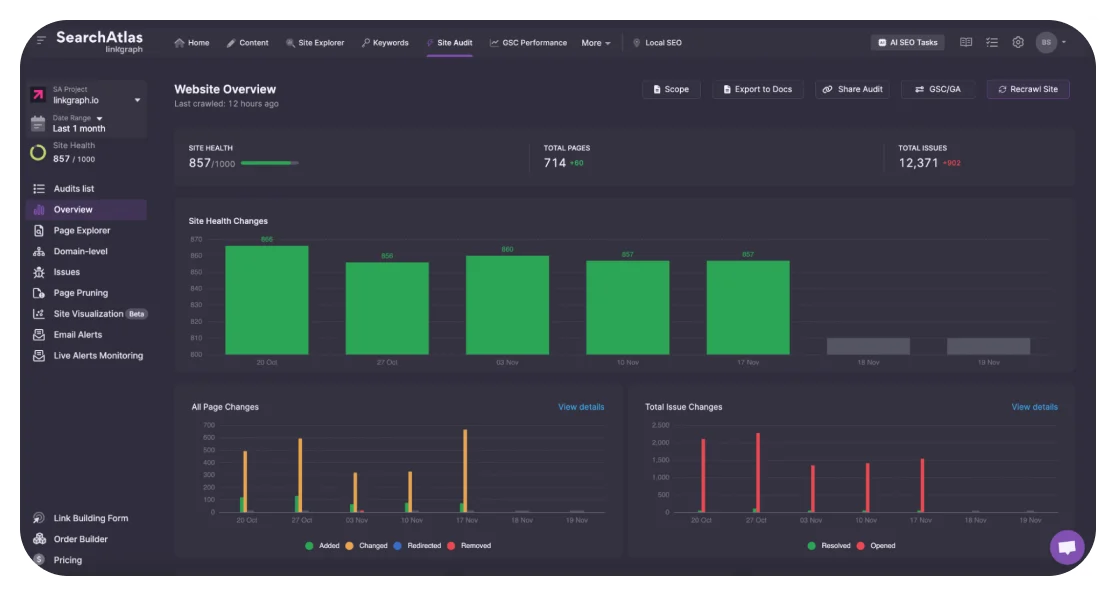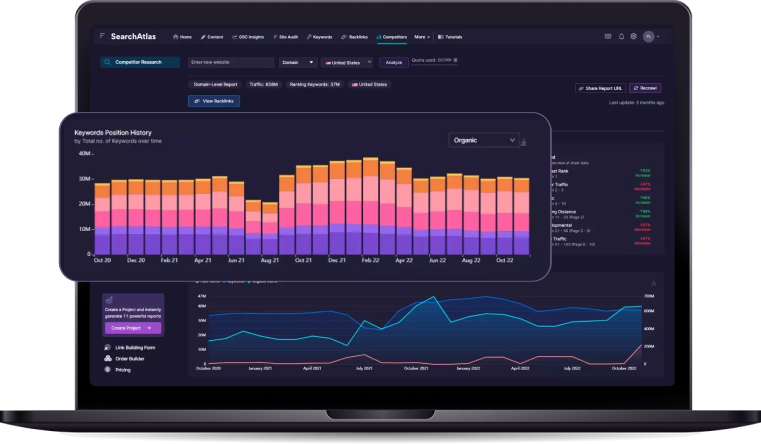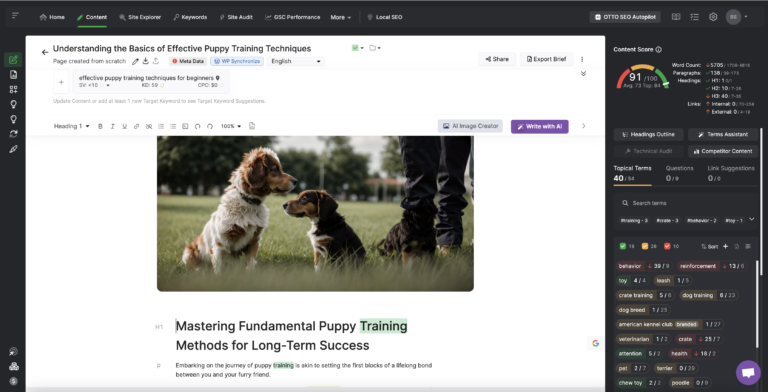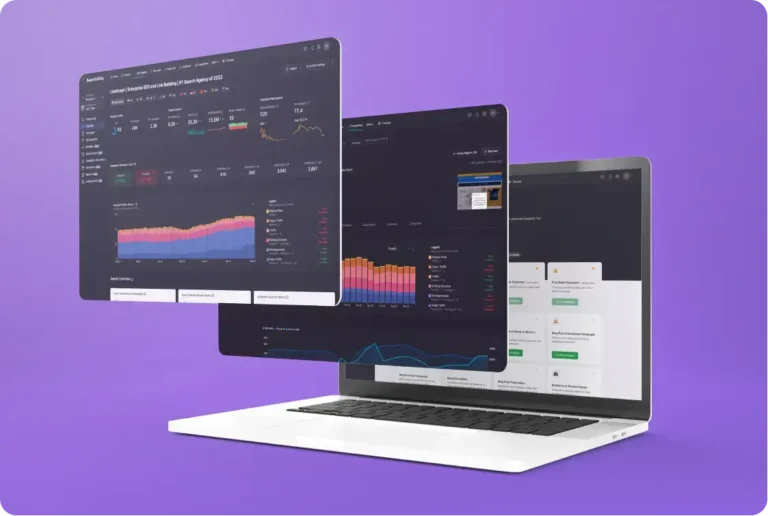Mastering SEO: Crafting Blog Articles With in-Depth Keyword Research
In the ever-evolving landscape of digital marketing, keyword research stands as the cornerstone of a successful SEO strategy, especially for crafting impactful blog articles.
A thorough understanding of keyword intricacies can elevate your content, align it with your target audience’s queries, and amplify your visibility in organic search results.
By harnessing the power of SearchAtlas’s Keyword Researcher tool, bloggers can uncover the terms and phrases that resonate with their readers and search engines alike.
Keep reading to master the art of integrating robust keyword research into your blog writing process, ensuring your articles reach their full potential.
Key Takeaways
- Keyword Research Is Foundational to Effective SEO Strategies and Content Relevance
- Long-Tail Keywords, While More Specific Than Short-Tail, Often Result in Higher Engagement and Conversion Rates
- SearchAtlas’s Keyword Researcher Tool Simplifies the Process of Mining Data to Create a Powerful, Focused Keyword List
- Proper Keyword Use Is Vital for SEO, as It Enhances Search Visibility While Maintaining Content Quality and Reader Engagement
- Competitor Keyword Analysis Reveals Opportunities for Differentiation and Informed Content Strategy Refinement
Understanding the Basics of Keywords in SEO

Keywords form the cornerstone of effective Search Engine Optimization (SEO), acting as the conduits through which users find their way to content.
At the heart of any SEO strategy lies a clear understanding of the types of keywords—ranging from the concise intensity of short-tail terms to the specificity afforded by long-tail phrases—and their implications for content creation.
These crucial elements dictate a website’s visibility on the search engine results page and profoundly influence a content strategy, guiding creators on the meticulous journey of drafting pieces that resonate with their target audience’s search behavior.
Defining Keywords and Their Role in SEO
Keywords serve as the Navigational Beacons Within the Digital Landscape, signaling search engines about the topics and themes embedded within web content. They are the nexus between what people are actively searching for and the content a site offers, essentially bridging the gap between curiosity and knowledge.
In the realm of SEO, the strategic use of these keywords aims to enhance a website’s discoverability, thereby elevating its status on search engine rankings. By meticulously aligning content with user intent, a website can cultivate an organic presence that not only garners web traffic but fosters relevance and authority within its niche.
Types of Keywords: Short Tail vs Long Tail
Short tail keywords consist of broad, often one-to-three-word phrases that capture a widespread query’s essence. These are highly competitive due to their high search volume but can be less effective in matching specific user intent, often leading to a lower conversion rate despite potentially increasing web traffic.
Conversely, long tail keywords typically span beyond three words, catering to a more refined, detail-oriented search query. They strike a balance between search volume and competition, enabling content creators to target niche demographics with greater precision, often resulting in higher engagement and conversion rates.
How Keywords Affect Your Content Strategy
Keywords serve as the compass that steers the direction of any content strategy, emphasizing the importance of tailoring articles to the queries and interests that preoccupy the target market. A well-researched keyword list becomes the blueprint for Crafting Blog Entries that address user needs, ensuring each paragraph resonates with readers and search engines alike.
Incorporating a solid keyword foundation into blog articles amplifies the potential to attract meaningful web traffic, thereby bolstering a brand’s digital marketing efforts. Content creators who leverage in-depth keyword research are equipped to produce pieces that not only rank highly on the search engine results page but also encapsulate the user experience, ultimately leading to sustained reader engagement and loyalty.
The Step-by-Step Guide to Performing Keyword Research

Embarking on the journey of keyword research is akin to setting sail across the vast seas of digital marketing, where each keyword holds the power to navigate creators toward the desired destination of their blog’s content strategy.
As artisans of the written word aim to marry creative expression with tactical SEO insight, the initial step revolves around identifying the core topics that capture the essence of their blog.
Subsequently, the mastery of employing keyword research tools with precision enables the synthesis of a robust strategy.
Alongside these tools, the analytical endeavor of dissecting keyword difficulty and search volume unfolds, equipping marketers with the acumen to discern the most opportune keywords to propel their content to the summit of search engine results—a strategic process that demands both keen perception and shrewd digital savoir-faire.
Identifying Core Topics for Your Blog
Identifying core topics forms the foundation of the keyword research process—before one can master the intricacies of SEO, it’s imperative to define the primary subjects that encapsulate the brand’s message. A content creator’s task is to pinpoint these thematic pillars that not only align with the brand’s vision but also have the potential to capture the interest of the desired audience.
Determining the right core topics leverages strategically chosen keywords that will drive targeted traffic to a blog. It’s about connecting with a reader’s interests and the queries they enter into their web browser: a synergy of brand identity and user behavior:
- Analyze the brand’s unique selling points and expertise to establish a high-level view of potential topics.
- Examine the target market’s search behavior to identify overlap areas with the brand’s core competencies.
- Evaluate industry trends and topical relevance using keyword research tools to refine and focus topic selection.
Armed with a firm understanding of core topics, content creators can move forward with the confidence that their keyword list will be both intentional and SEO-driven. It is this strategic identification that leads to a Content Strategy Capable of achieving natural text optimization and effectively reaching the target audience.
Using Keyword Research Tools Effectively
The efficacy of keyword research hinges on the discerning use of sophisticated tools, ones rooted in a deep comprehension of SEO intricacies. To this end, SearchAtlas’s Keyword Researcher Tool embodies the pinnacle of such technology, offering an unparalleled resource for marketers and content creators.
Crucially, the tool amplifies the power of keyword mining by distilling vast data sets into actionable insights, enabling users to distill their research into a refined, powerful keyword list. With an intuitive interface, the Keyword Researcher tool streamlines the process, transforming what was once an arduous task into a strategic asset:
- Initiate with a fundamental seed or concept to generate a broad spectrum of keyword ideas.
- Assimilate these findings, utilizing the keyword overview to gauge volume, competition, and relevance.
- Refine choices by examining metrics such as keyword density, predictive trends, and user intent.
By harnessing these capabilities, those charged with the craft of SEO can navigate beyond mere content creation, venturing into the territory of content mastery. The Keyword Researcher tool thus becomes not just a facilitator of keyword discovery, but a beacon guiding users towards SEO excellence and digital marketing success.
Analyzing Keyword Difficulty and Search Volume
SearchAtlas’s Keyword Researcher tool catapults the SEO professional into a landscape where assessing keyword difficulty and search volume is transformed into an art form. It allows creators to meticulously analyze each potential keyword’s hurdle rate, deciphering how accessible the SEO summit is, given current competition levels and the capability of one’s own digital strategy.
By providing insight into search volume, this advanced tool helps elucidate the frequency at which the target market employs specific keyword phrases, thereby informing a nuanced approach to content strategy. It enables the identification of volume keywords that strike the delicate balance between high user interest and manageable competition, ensuring blog articles are primed to capture the right kind of attention.
Crafting a Keyword Research Plan for Your Blog

Within the intricate tapestry of SEO, the mindful construction of a keyword research plan is more than mere selection; it’s a strategic alignment of goals, niche-targeting, and the harmonization of enduring topics with current trends.
A blog’s voyage to visibility and its ability to effectively reach an audience rest heavily upon setting precise goals for keyword performance.
It’s here, at this juncture, content marketers embark on selecting the quintessential keywords tailored specifically to their niche, a task demanding perceptive insight into their audience and industry.
This well-curated balance between evergreen keywords, which sustain relevance, and trending keywords, which capitalize on the ebbs and flows of user interest, set the stage for well-rounded articles that are both timeless and timely in their appeal to search behaviors.
Setting Goals for Keyword Performance
Achieving success in SEO demands the establishment of clear, Measurable Goals for Keyword Performance. Content creators must aim to increase their organic search results presence by targeting keywords that yield high search demand but maintain manageable competition levels.
It is essential to clearly define the benchmarks for success, whether that be an improvement in search engine rankings, an uptick in web traffic, or elevated engagement metrics. Prioritizing these performance objectives enables marketers to track progress and iterate their SEO strategy for optimal results.
Choosing the Right Keywords for Your Niche
Selecting the right keywords for a niche is a deliberate process, where the emphasis is on quality over sheer quantity. Creators must seek terms that resonate with the essence of their brand while catering to the intricate patterns of their target audience’s search practices.
Through SearchAtlas’s Keyword Researcher tool, content marketers gain access to a resource that unveils the most effective keywords, guiding their content to appeal to both search engines and the nuanced needs of their niche audience. This tool demystifies the process, enabling the delicate task of matching market demand with the blog’s distinctive voice.
Balancing Evergreen and Trending Keywords
The art of balancing evergreen and trending keywords is comparable to a botanical dance, where sustainability meets the temporal bloom. Evergreen keywords, the perennials of the SEO garden, ensure relevance through seasons, while trending keywords, akin to annuals, offer the burst of timely visibility that capitalizes on current events or seasonal interests.
To cultivate a garden of content that remains bountiful, content strategists must nurture both varieties: evergreen keywords anchor a presence in the fertile ground of constant search, and trending keywords catch the passing breeze of temporary but high-volume traffic:
| Keyword Type | Benefits | Content Strategy Considerations |
|---|---|---|
| Evergreen | Long-lasting relevance, consistent traffic | Integrate into foundational content, update periodically to maintain freshness |
| Trending | Immediate traffic spikes, engagement with current topics | Use for time-sensitive material, align with news cycles or seasonal peaks |
This dual approach not only extends the content’s life cycle but also broadens its reach, making sure it stays vigorous within the search engine’s domain while engaging with a wider audience spectrum.
Discovering High-Value Keywords for Your Articles

In the quest to master SEO and fortify the digital footprint of a blog, the discovery of high-value keywords stands as a pivotal component of any content strategy.
The pursuit of these valuable keyword treasures requires more than a casual sift through the vast sands of data; it calls for the adept use of insightful tools that can unveil those elusive keyword gems often overlooked by less meticulous research.
It is not merely the volume of searches that determines the worth of a keyword, but rather its intrinsic value in aligning with user intent and driving meaningful engagement.
This subtle, yet crucial distinction serves as the backbone for optimizing articles to achieve impact where it matters most—in connecting with and expanding a dedicated readership base.
Tools for Uncovering Hidden Keyword Gems
SearchAtlas’s Keyword Researcher tool excels in the vital task of exposing high-value keywords that are essential for content strategists seeking to refine their blog articles. It grants users the remarkable capability to surface less obvious, yet highly engaging keyword options that are ripe for crafting content poised to attract and retain an audience’s attention.
As an advanced solution in the SEO toolkit, the tool adeptly analyzes and presents keywords that align with current search trends and user intent, offering a competitive edge to the diligent content creator. By optimizing articles with these targeted keyword insights, bloggers can achieve a heightened level of organic reach and relevance within their niche.
The Importance of Keyword Value Over Volume
In the grand tapestry of blog article creation, prioritizing keyword value offers a more strategic pathway than chasing after sheer search volume. It’s essential for bloggers to realize that keywords with a higher value have a greater likelihood of converting visitors into followers or customers, as they are closely aligned with the user’s search intent and their stage in the buyer’s journey.
Content tailored to high-value keywords often results in more concentrated web traffic comprised of individuals with a genuine interest in the subject matter or a stronger readiness to engage with the brand. Despite potentially lower search volumes, these keywords can dramatically increase the quality of web traffic and improve the overall effectiveness of one’s SEO efforts.
Incorporating Keywords Naturally Into Your Blog Content

Transforming a blog into an SEO success story extends beyond just identifying keywords; it is about weaving them intricately into the narrative fabric of blog articles.
The sensibilities of today’s readers coupled with the sophistication of search algorithms demand an organic integration of search terms, where value and readability take precedence.
As content creators aspire to optimize their prose within the perimeters of SEO best practices, they confront the dual challenge of enriching their articles with the right amount of keywords while steering clear of the precarious path of keyword stuffing.
This delicate balancing act not only enhances the discoverability of content but also preserves the inherent quality and user experience that are pivotal to any impactful blog.
Best Practices for Keyword Placement
Integrating keywords into blog content demands a strategic approach that ensures both search engine compatibility and reader engagement. Placement should be intentional, with keywords naturally embedded within the article, such as weaving them into the title, headings, and subheadings where they enhance comprehension and retain the content’s flow.
Effective SEO blogging relies on the location of target phrases within the content, orchestrated so as to fortify the narrative and not disrupt the user experience. It is crucial to disperse them evenly throughout to maintain an organic tone and facilitate a seamless reading journey:
- Anchor keywords strategically in the opening paragraph to set a clear focus.
- Infuse them within the body where they contribute to the overall argument or narrative.
- Employ them in the conclusion to reinforce the core message and call-to-action.
In the context of modern digital content, mastery of keyword placement transcends mere visibility; it manifests in the subtle art of achieving natural text optimization. This seamless integration not only aligns with url structure best practices but also underscores the content strategy’s relevancy, directly impacting a website’s standing on the search engine results page.
Avoiding Keyword Stuffing While Optimizing
Ensuring the proper use of keywords necessitates a fine balance, one that serves to enhance content without overwhelming it. A frequent pitfall is keyword stuffing, a practice where keywords are shoehorned into a text to an excessive degree, often at the expense of readability and coherence. SearchAtlas champions the philosophy of placing keywords strategically, promoting meaningful integration that supports content fluency and maintains focus on the value provided to the reader.
To sidestep the detriments of keyword stuffing, content professionals ought to concentrate on the genuine inclusion of keywords that organically contribute to the subject matter. This approach maintains content integrity and appeals to the search engine’s preference for user-centric, quality material. SearchAtlas’s Keyword Researcher tool aids in identifying the most relevant keywords, supporting creators to enhance their SEO strategy while upholding the natural flow of their articles.
Optimizing Your Blog Structure With Keyword Research

Embarking on the Intricate Journey of Search Engine Optimization requires a judicious blend of creativity and analytical prowess, particularly when infusing a blog’s structure with the fruits of comprehensive keyword research.
Crafting a robust on-page SEO fortress is contingent upon the discerning placement of targeted keywords that act as the bedrock for both hierarchy and readability.
An adroit structuring of primary and secondary keywords not only shapes the narrative arc but lays the foundation for content that engages both algorithms and readers alike, setting the stage for enhanced searchability and user experience.
Enhancing on-Page SEO With Targeted Keywords
Armed with information gleaned from meticulous keyword research, content creators can craft blog articles that boast optimal on-page SEO. Precise keyword deployment throughout the blog’s structure—notably in the title, meta descriptions, and headings—significantly boosts the content’s visibility and relevance on search engine results pages.
Intelligent keyword placement acts as a lighthouse for web traffic, directing search queries to the article’s shores. By embedding the right keywords in strategic locations, bloggers enable search engines to understand and rank the content efficiently, leading to a potent rise in organic discoverability.
Structuring Hierarchy With Primary and Secondary Keywords
Building a powerful blog infrastructure demands astute attention to the hierarchical distribution of primary and secondary keywords within the content. Primary keywords act as the cornerstone of a topic, conveying the central theme around which the entire piece is constructed, while secondary keywords serve to provide additional layers of relevance and detail, enhancing the narrative structure for both search engines and readers.
Bloggers who craft their articles with such a methodical approach to keyword hierarchy are poised to manifest an information architecture that search engines appreciate and readers navigate with ease. This hierarchy signals the importance of various sections and topics within the content, allowing search engines to index the page intelligently and offer users a clearer understanding of the article’s scope and focus.
Measuring the Impact of Keyword Optimization

Aspiring to the zenith of SEO mastery requires not only the strategic selection and placement of keywords but also a commitment to vigilantly tracking the performance of those choices.
For those involved in crafting blog articles, the journey towards effective SEO is punctuated by regular assessments of keyword rankings and the discerning analysis of data-driven feedback.
Such ongoing evaluations serve as the compass that guides continuous refinement, empowering content creators to adapt their strategies in response to the shifting landscapes of search engine algorithms and user engagement patterns.
Tracking Keyword Rankings and Performance
As individuals immerse themselves in the realm of SEO, tracking the performance of optimized keywords becomes indispensable for gauging the efficacy of their content strategy. By regularly monitoring keyword rankings, bloggers can pinpoint how their articles stack against competitors on the search engine results page, offering actionable insight that drives further optimization.
Analyzing metrics afforded by the SearchAtlas tool enables creators to witness the tangible outcomes of their SEO endeavors in real time. This critical process not only informs the continuous evolution of marketing strategies but also equips them with data to tailor future articles for maximum impact and audience engagement.
Using Analytics to Adjust Your Keyword Strategy
Analytics serve as the guiding light for dynamic keyword optimization, providing invaluable feedback on how a blog’s content resonates with its target audience. This data-driven landscape presents opportunities for content creators to refine their keyword strategy, ensuring that their efforts reverberate effectively across the vastness of the digital realm.
| Metric | Impact Assessment | Keyword Strategy Adjustment |
|---|---|---|
| Click-Through Rate (CTR) | Evaluates user engagement with search results | Optimize title tags and meta descriptions for better traction |
| Bounce Rate | Insight into content relevance and user satisfaction | Enhance content quality and alignment with user intent |
| Conversion Rate | Measures effectiveness in meeting business objectives | Adjust content to better cater to the target market’s behavior |
Assiduous engagement with these analytics propels marketers toward a more nuanced appreciation of their audience’s behaviors and preferences: When these insights translate into strategic modifications, the keyword strategy evolves, fostering improvements in both content relevancy and the achievement of overarching marketing goals.
Staying Ahead With Ongoing Keyword Research Trends

As the digital landscape perpetually transforms, content creators must embrace the pulse of progression in keyword research to maintain a stronghold in SEO.
Adapting swiftly to algorithm updates and exploring emerging keywords are fundamental to forging a formidable content strategy.
These proactive steps ensure that blog articles not only align with the current trajectory of search engine algorithms but also resonate with evolving trends within their industry.
By doing so, bloggers position themselves at the forefront of SEO innovation—capturing the attention of both search engines and readers through expertly crafted, relevant, and timely content.
Adapting to Search Engine Algorithm Updates
To keep a blog’s content strategy relevant and effective, constant vigilance for search engine algorithm updates is paramount. Tactical agility in the realm of SEO helps content creators tailor their blog keywords to align with the latest algorithmic preferences, safeguarding their search engine visibility.
Staying current with algorithm shifts allows bloggers to not only pre-empt potential dips in web traffic but to capitalize on new opportunities. A firm grasp of evolving search patterns empowers them to pivot their keyword strategy swiftly, effectively harnessing the dynamic nature of SEO to maintain a competitive edge.
| SEO Component | Impact of Algorithm Update | Response Strategy |
|---|---|---|
| Content Quality | Enhanced scrutiny on informative and user-focused content | Invest in comprehensive research and authoritative writing |
| Keyword Optimization | Shifting emphasis on keyword relevance and diversity | Expand and refine keyword usage to meet updated criteria |
| User Experience | Incorporation of user engagement metrics into ranking factors | Optimize website design and interactivity for better user retention |
Exploring Emerging Keywords in Your Industry
To remain at the forefront of digital marketing success, content creators must continuously scout for emerging keywords within their industry. These terms reflect the latest developments, consumer interests, and market shifts, offering a fresh reservoir of content inspiration that can position a brand as a thought leader.
Proactively incorporating these nascent terms into blog content affords marketers the opportunity to connect with new audience segments and tap into previously untapped search traffic. By always having a finger on the pulse of industry-specific keyword evolution, professionals can ensure their content remains relevant and highly discoverable:
| Keyword Trend Analysis | Benefits to Content Strategy | Action Steps |
|---|---|---|
| Real-time keyword discovery | Fosters topical relevance and positions brand as industry forerunner | Regularly monitor industry news and incorporate findings |
| Consumer behavior alignment | Enhances content resonance with the target audience | Analyze search query reports and adapt content topics accordingly |
Keyword Research Mistakes to Avoid in Blog Writing

In the nuanced domain of optimizing blog articles through keyword research, adeptly evading missteps is just as crucial as executing proven strategies.
Whether it’s the misjudgment in keyword selection or mishandling their application within the content, such oversights can undermine an otherwise solid SEO foundation.
Understanding common pitfalls and learning from past missteps empowers content creators to refine their approach, ensuring their blogs resonate with precision and effectual reach in the digital arena.
Common Pitfalls in Keyword Selection and Use
One widespread mistake in keyword selection is an overemphasis on high-volume search terms at the expense of relevance to the target audience. This oversight can lead content creators to chase after keywords that, while popular, might not yield the tightly focused readership that is crucial for engagement and conversion.
Another key error frequently encountered in keyword use is the neglect of long-tail keywords, which offer targeted reach and less competition. Failure to include these in a content strategy can result in missed opportunities to connect with a more intent-driven segment of the market.
| Pitfall | Consequences | Prevention Strategies |
|---|---|---|
| Focusing only on high-volume keywords | Limited engagement, irrelevant traffic, lower conversions | Balance volume with relevance, engage niche audiences |
| Overlooking long-tail keywords | Missed targeted opportunities, higher competition | Incorporate detailed phrases aligned with specific user intent |
Learning From Keyword Research Failures
Grasping the subtle cues from previous keyword research setbacks equips content creators with the insight to improve their SEO tactics. Acknowledging that every failed keyword attempt exposes the intricacies of audience search patterns supports the evolution of a more targeted content strategy.
Professionals in the SEO sphere recognize that learning from keyword research failures is indispensable for refining their approach to blogging. Incorporating this knowledge allows for an enhancement in both the precision of keyword selection and the art of content optimization, thus leading to stronger, more effective SEO outcomes.
Learning From the Competition: Keyword Research Insights

In the realm of Mastering SEO, scrutinizing the keyword strategies of competitors can offer invaluable insights that inform and refine a content marketer’s approach.
By analyzing the keyword landscape that rivals have staked a claim in, professionals can uncover gaps and opportunities for differentiation.
This practice of competitive analysis not only serves to illuminate potential areas for advancement but also plays a critical role in crafting an informed and targeted SEO strategy.
It lays the groundwork for content that not only stands out but also conveys a deep understanding of the market’s dynamics.
Analyzing Competitor Keywords for Opportunities
Analyzing the keyword selections made by competitors offers fertile ground for identifying untapped markets and fine-tuning one’s own keyword strategy. By observing which terms drive traffic to their blogs and where they rank on search engine results pages, content marketers can discern strategic openings and potential niche segments underrepresented by current top players.
Well-executed competitor analysis reveals not only the keyword strengths but also the weaknesses in their SEO approaches, paving the way for improved content differentiation. Through a meticulous examination of their keyword placements and density, one can tailor blog articles to capture a unique position in the SEO landscape:
- Evaluate competitor keyword rankings to spot patterns and opportunities for differentiation.
- Assess the breadth and depth of their keyword usage to identify gaps in the market.
- Use keyword insights to enhance one’s own content, ensuring it complements rather than directly competes with existing high-performers.
This strategic reconnaissance into competitor keyword allocation supports a content strategy that’s both responsive and proactive. It encourages the optimization of articles in a way that’s cognizant of the competitive SEO terrain, favoring the capture of eager audiences that competitors may have inadvertently overlooked.
Leveraging Competitive Analysis to Inform Your Strategy
Leveraging competitive analysis empowers content creators to craft an SEO strategy that transcends mere imitation, evolving into a blueprint for distinction within the market. Armed with insights from competitors’ keyword performance, savvy marketers can pinpoint unique angles and opportunities for content that captures untapped audience segments, setting their blog apart from the noise of digital competition.
Informed by the diligent scrutiny of competitor strategies, a content marketer’s approach to keyword research becomes a sophisticated chess game. They can skillfully position their content to fill the voids left by others, deploying a calculated array of keywords that cater precisely to the needs and preferences of their target market, securing a stronghold in niche search spaces that competitors have yet to fully explore.
Conclusion
In conclusion, mastering SEO through in-depth keyword research is essential for creating blog articles that effectively attract and retain audience attention.
Properly selecting and strategically placing the right mix of short-tail and long-tail keywords ensures that content not only resonates with user intent but also ranks favorably on search engine results pages.
By leveraging sophisticated research tools to discover high-value keywords and by continuously adapting to emerging trends and algorithm updates, content creators can enhance their blog’s structure and reader engagement.
Additionally, avoiding common pitfalls, learning from competitors, and meticulously tracking performance data are crucial for continually refining an SEO strategy.
Ultimately, a nuanced approach to keyword research and optimization is what elevates blog content, leading to increased visibility, engagement, and success in the digital marketplace.









